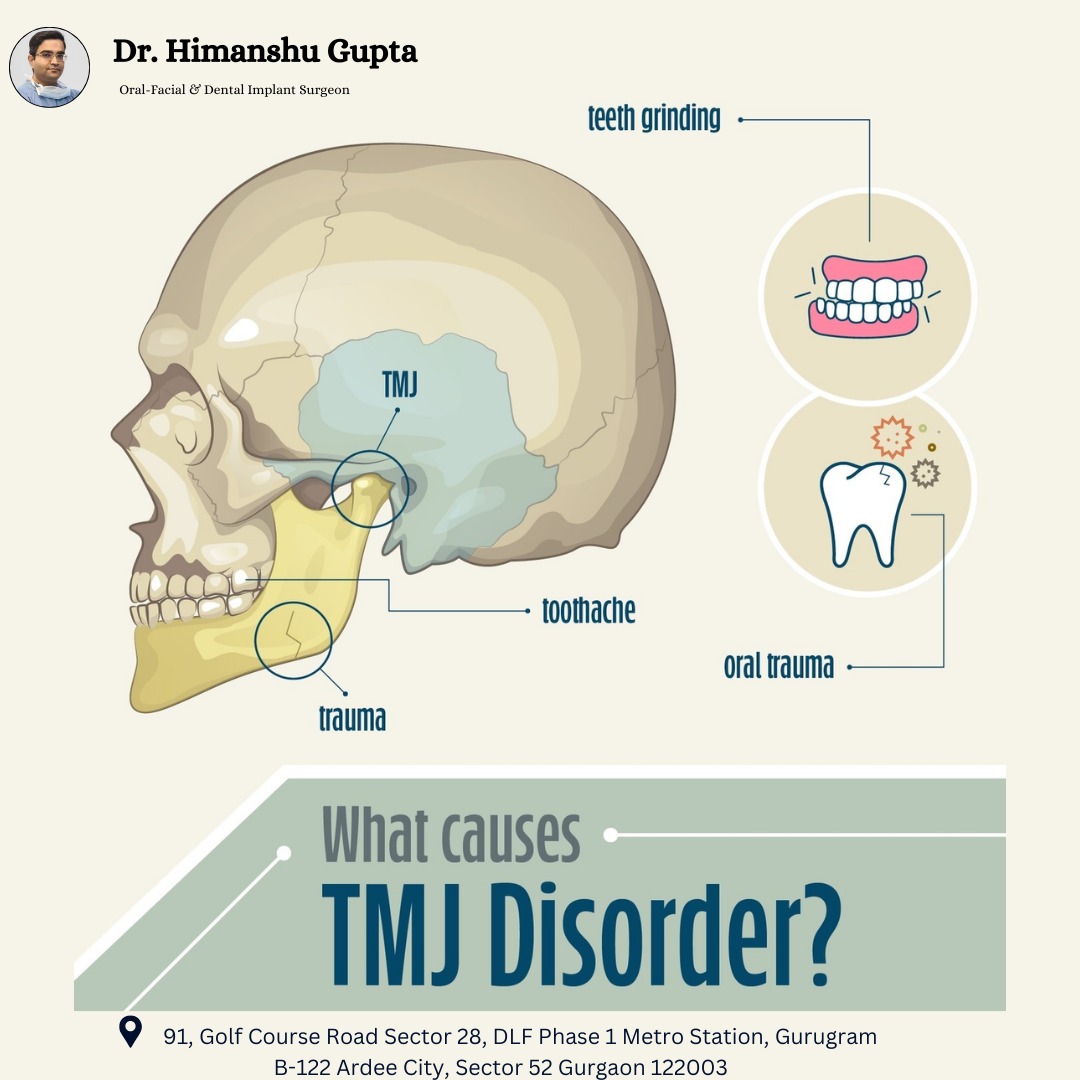TMJ (Temporomandibular Joint) disorder is a condition that affects the jaw joint and the muscles responsible for jaw movement. This disorder can lead to considerable pain, discomfort, and functional limitations, impacting daily activities like talking, chewing, and yawning. If you’re facing TMJ disorder symptoms in Sector 28, Gurugram, seeking the expertise of a qualified professional is vital. Dr. Himanshu Gupta, known as the best oral and maxillofacial surgeon in Sector 28, Gurugram, offers a comprehensive range of surgical and non-surgical TMJ disorder treatment designed to relieve symptoms and restore normal jaw function.
What is TMJ Disorder?
The temporomandibular joint serves as a crucial connector between your jawbone and skull, functioning as a sliding hinge. When this joint malfunctions, it can result in TMJ disorder, which presents with a variety of symptoms, including:
- Persistent jaw pain or tenderness
- Clicking, popping, or grinding noises during jaw movement
- Difficulty or discomfort when chewing
- Lockjaw, making it difficult to open or close the mouth
- Earaches or frequent headaches
If you’re experiencing any of these symptoms, it’s essential to seek expert care for an accurate diagnosis and tailored treatment plan.
Non-Surgical Treatments for TMJ Disorder
Dr. Himanshu Gupta, the best oral and maxillofacial surgeon in Sector 28, Gurugram, often begins with non-surgical treatments, which are less invasive and can effectively manage TMJ disorder symptoms.
1. Medications
- Pain Relievers and Anti-Inflammatories: Over-the-counter medications like ibuprofen or prescribed pain relievers can reduce pain and inflammation in the jaw area.
- Muscle Relaxants: These are sometimes prescribed for short-term use to relieve jaw muscle tension and spasms.
2. Physical Therapy
- Jaw Exercises: Specialized exercises can help strengthen jaw muscles, enhance flexibility, and alleviate discomfort.
- Heat and Cold Therapy: Applying warm compresses or ice packs to the jaw can reduce pain and swelling.
3. Oral Appliances
- Mouth Guards or Splints: Custom-fitted devices can prevent teeth grinding and jaw clenching, which are common causes of TMJ disorder.
4. Lifestyle Modifications
- Dietary Adjustments: Eating soft foods, avoiding chewing gum, and limiting jaw movements can reduce stress on the temporomandibular joint.
- Stress Reduction Techniques: Since stress can aggravate TMJ symptoms, methods like meditation, yoga, and deep breathing exercises can be beneficial.
5. Injections
- Corticosteroid Injections: These can help reduce inflammation and pain in the TMJ region.
- Botox Injections: In certain cases, Botox can be used to relax jaw muscles, providing relief from TMJ-related symptoms.
Surgical Options for TMJ Disorder
When non-surgical treatments are insufficient, surgical intervention may be necessary. Dr. Himanshu Gupta, renowned for his expertise in TMJ disorder treatment in Sector 28, Gurugram, offers several surgical procedures tailored to the specific needs of each patient.
1. Arthrocentesis
- A minimally invasive procedure where small needles are inserted into the joint to flush out debris and inflammatory byproducts. It’s commonly used when the jaw is locked or in cases of severe pain.
2. Arthroscopy
- This involves a small incision near the ear, where an arthroscope (a tiny camera) is inserted into the joint. Dr. Himanshu Gupta uses this technique to remove inflamed tissue, realign the joint, or smooth bone surfaces.
3. Open-Joint Surgery
- In severe cases, open-joint surgery may be required. This involves a more extensive incision to repair or replace the joint. Although more invasive, it is effective for patients with significant structural damage to the TMJ.
4. Total Joint Replacement
- For patients with extreme joint damage, total joint replacement is often the best solution. This procedure involves replacing the damaged TMJ with custom-made prosthetic joints, which restores function and relieves pain.
Why Choose Dr. Himanshu Gupta for TMJ Disorder Treatment in Sector 28, Gurugram?
Dr. Himanshu Gupta is widely recognized as the best oral and maxillofacial surgeon in Sector 28, Gurugram, due to his comprehensive approach to TMJ disorder treatment. Whether you require non-surgical management or surgical intervention, Dr. Gupta’s vast experience and dedication ensure you receive the highest standard of care, personalized to meet your specific needs.
His advanced clinic in Sector 28, Gurugram, is equipped with cutting-edge technology, allowing for precise diagnosis and effective treatment of TMJ disorders. Dr. Himanshu Gupta’s commitment to patient well-being and his extensive expertise make him the preferred choice for anyone seeking TMJ disorder treatment in Sector 28, Gurugram.


